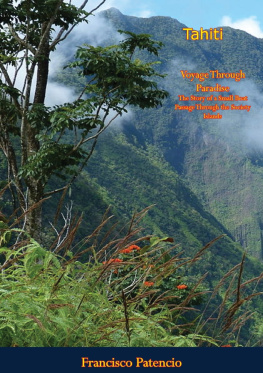TAHITI
Calderon was a member of the lost generation of young English poets, artists and writers who perished during World War I. Described as a latter-day knight-errant for whom life was a great adventure, he visited Tahiti in 1906. Its people and their life sunk very deeply into his heart, and he began to write of his time on the island, reliving his Tahitian days with a joy that was a part of him until his untimely death.
Calderon's is the romantic Tahiti par excellence, captured in prose that eclipses the romances of Pierre Loti and the poetry of Rupert Brooke: Towns grow mysterious and wonderful with nightfall, graceful figures emerge from the darkness under the trees and the air is heavy with unknown spicy things. The beautiful women of Tahiti, trellised verandahs and gardens with big-leaved plants cast their moonlight spell. There is no better account of these most magical of south Pacific islands, and no better memorial to a brief life lived to the full.
GEORGE CALDERON was educated at Rugby School in England and died at Gallipolli on 4th June 1915.
THE KEGAN PAUL
TRAVELLERS SERIES
A Journey Through Persia and Turkish Armenia Gerald Reitlinger
A Summer in Touraine Frederic Lees
A Winter in Majorca George Sand
A Woman in the Balkans Winifred Gordon
Adventure in Hawaii and Tahiti Edward T. Perkins
Alexandria: The Ancient and Modern Town E. Breccia
Autobiography of a Chinese Girl Hsieh Ping-Ying
Burma R. Talbot Kelly
Chinese Pictures J. F. Bishop
Egypt and Nubia J. A. St. John
Fifty Years in Maoriland James T. Pinfold
In Hawaii with Jack London Jack London
In Stevenson's Samoa Marie Fraser
Island Nights' Entertainments Robert Louis Stevenson
Man and Animals in the New Hebrides John R. Baker
Mongolia N. Prejevalsky
My Consulate in Samoa William B. Churchward
News from Tartary Peter Fleming
Oceania Frank Fox
Unbeaten Tracks in Japan Isabella Lucy Bird
Old Touraine Theodore Andrea Cook
The Discovery of Tahiti George Robertson
The French Riviera Pierre Devoluy and Pierre Borel
The Golden Chersonese Isabella Lucy Bird
The Heart of the Orient Michael Myers Shoemaker
The Riviera Hugh Macmillan
The Romance of Treasure Trove Charles R. Beard
To Lhasa in Disguise William Montgomery McGovern
Treasure of Ophir C. E. V. Craufurd
A Year Amongst the Persians Edward Granville Browne
Constantinople and Istanbul Old and New H. G. Dwight
Tahiti George Calderon
Cruise of the Snark Jack London
In the South Seas Robert Louis Stevenson
Six Months in Hawaii Isabella Bird
Korea and Her Neighbours Isabella Bird
Strolling Through Istanbul H. Sumner-Boyd and J. Freely
Camp Life and Sport in Dalmatia and the Herzegovina Anonymous
Quest for Sheba Norman Stone Pearn and Vernon Barlow
An English Consul in Siam W. A. R. Wood
Voyages in the Orient Gerald De Nerval
The Loyal Karens of Burma Donald Mackenzie Smeaton
Romance of a Harem Clarence Forestier-Walker
South Sea Idyls Charles Warren Stoddard
Hawaii: The Past, Present and Future of its Island-Kingdom Gerald Manly
Hopkins

First pubished 2004 by
Kegan Paul Limited
Published 2013 by Routledge
2 Park Square, Milton Park, Abingdon, Oxon OX14 4RN
711 Third Avenue, New York, NY 10017, USA
Routldge is an imprint of the Taylor & francis Group, an informa business
Kegan Paul, 2004
All rights reserved. No part of this book may be reprinted or reproduced or utilised in any form or by any electronic, mechanical, or other means, now known or hereafter invented, including photocopying and recording, or in any information storage or retrieval system, without permission in writing from the publishers.
ISBN: 978-0-710-30754-5 (pbk)
British Library Cataloguing in Publication Data
A catalogue record for this book is available from the British Library.
Library of Congress Cataloging-in-Publication Data
Applied for.
TO
ARITANA
THE COMPANION OF MY TRAVELS
Eine grosse Landstrass' ist unsre Erd',
Wir Menschen sind Passagiere;
Mann rennet und jaget, zu Fuss und zu Pferd,
Wie Lafer oder Kuriere.
Kaum trafen wir uns auf derselben Station,
Herzliebster Prinz Alexander,
Da blst schon zur Abfahrt der Postillon
Und blst uns schon auseinander.
Heine.
E NA
TA'U HOA ITI
here rahi hia
o te parahi ra
i roto ite oire o Pape-ete,
ua haamo hia
teinei parau.
CONTENTS
LIST OF PLATES
(From pencil sketches by George Calderon. Unfortunately many of these sketches are done on very rough, water-colour paper, which causes some of the delicacy to be lost in reproduction.ED.)
TIHOTI
PREFACE
GEORGE CALDERON was killed in Gallipoli on 4th June 1915. He had visited Tahiti in 1906. Its people and their life had sunk very deeply into his heart ; but when he returned home he deliberately put his diaries aside, postponing for several years the book he intended to write, in order that he might recall the memory in due perspective. Meanwhile he made laborious and exhaustive research into the history of the European influences to which the island had been exposed, for comparison with his own impressions.
He began to write his book in the winter of 19131914 and was at work on it for some months before the war. He left it incomplete, but there is a synopsis which shows how he meant to construct it. Some parts of the book were practically finished ; others existed in many forms, among his notes and sketches, and with the help of these the book has been brought to the shape in which it is now published.
There has been no smoothing or polishing by any hand but his own. Selections have been made from his papers, and certain passages come directly from the diaries which he wrote on the spot. Very often the same matter was found in different versions and that one chosen which seemed nearest to his intention. He had planned to devote a section to the language, of which he had made a very careful study, and another section to the more remote history of the island, its manners and customs. As to the first of these, no one but himself could tell how he meant to deal with his copious notes on the language ; the second is represented by a few pages in Walking South, where some of his notes are put together with his own comments. The reader will understand how the book inevitably shows unevenness, save for the chapters which had received the author's finishing touch.
When he at last made up his mind to begin this book he approached it almost with dread, lest he should not be able to recapture his old sense of the wonderful island. His pleasure was deep when he found himself able to do so. I remember the joy with which he told me that he was completely reliving those Tahitian days, that their atmosphere was all round him as he worked; while his own experience fell into line with the knowledge that he had since acquired. The book as it now appears is far from being the book that he meant it to be, and that it would have been if he had lived. And yet, even as it is, it has seemed to those who have read it since his death to be so full of the life of which it tells that one dares to hope that his intention may not be altogether unfulfilled, that some part of it at least, and an essential part, lives in these pages.










